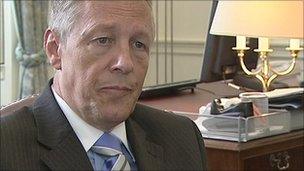McGuinness warns Robinson over education comments
- Published

The Deputy First Minister has warned the First Minister against "taking on" the Catholic Church over the provision of education.
Martin McGuinness was responding to a speech on Friday by Peter Robinson in which he described the NI education system as "a benign form of apartheid".
Mr Robinson said that while he had no objection to church schools, he objected to the state funding them.
Mr McGuinness said Mr Robinson was making a mistake.
"If Peter thinks taking on the Catholic Church, the Catholic bishops and indeed the Protestant churches for that matter and other interest groups is a sensible route to go, I think that is a big mistake," he said.
"I think what we have to do is try and achieve and continue to build a consensus within our society about the need to develop shared services.
"If you go for a head-on collision with the so-called vested interests, that is a collision course which will lead us into a total and absolute mess."
Earlier, the Council for Catholic Maintained Schools (CCMS) had challenged the First Minister over his comments about the future of education.
Donal Flanagan, chief executive of CCMS, questioned the timing of Mr Robinson's intervention.
"He is certainly not speaking as an educationalist because everybody knows that ethos adds value to education," he added.
"If Peter Robinson wants an open, honest and inclusive debate on the future of education in Northern Ireland then why would he choose a platform at the installation of a DUP mayor in Castlereagh to launch this so I have to question his motive."
On Saturday, Bishop Donal McKeown said the right of parents to choose a faith-based education must be recognised.
He said it was the "hallmark of a stable and pluralist society".
"This key principle, which recognises the right of parents, is guaranteed by the European Convention for Human Rights," the chair of the Northern Ireland Commission for Catholic Education said.
"It is worth pointing out that parents who choose faith-based schools for their children, pay taxes toward the provision of that education.
"The Catholic Church has also contributed substantial funding and resources for the provision of Catholic schools over generations, and this has ultimately saved the taxpayer money."
On Friday, Mr Robinson also said he wanted to set up a commission to look at the total integration of the different sectors.
He compared the system to South Africa during apartheid where black and white children were educated separately.
In an apparent reference to Catholic schools, he said he had no objection to church schools but he did object to the state paying for them.
"It may take ten years or longer to address this problem, which dates back many decades, but the real crime would be to accept the status quo for the sake of a quiet life," he said.
Integrated sector
"The benefits of such a system are not merely financial but could play a transformative role in changing society in Northern Ireland."
He added that there were a number of "knotty issues" such as "religious education, school assembly devotions and the curriculum".
"Future generations will not thank us if we fail to address this issue," the DUP leader said.
It would be difficult to dislodge "vested interests", he said, but was "convinced" that it should be done.
The DUP position has been that the state - or controlled - sector was non-denominational and could be used by those of all religions and none.
Mr Robinson said he was proposing a single education system, rather than enlarging the integrated system which he did not believe would create the critical mass needed to make a real difference.
However, Noreen Campbell from the NI Council for Integrated Education said Mr Robinson's speech was a significant contribution to the debate.
"For the first time, a major politician has said that a separate system of education is not good for our society generally - that there are moral issues about it," she said.
"He has actually made some of the points we in the integrated movement have been making for years and he has said that there ought to be a major commission to look at educational provision here in Northern Ireland, that has got to be welcomed."
- Published16 April 2009
- Published25 August 2010
- Published13 March 2009